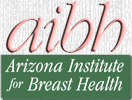Important Things To Remember
The best defense against breast cancer is early detection.
It is very important to be educated on the facts and statistics
of breast cancer. Because women need to know certain facts about
breast cancer, it is critical to be kept updated and educated on
all the risks and treatment options. Take a moment and review the
following questions and answers.
Who is at risk for developing breast cancer?
Every woman is at risk for breast cancer and her risk increases
with age. Breast cancer is the most common cancer among women.
More than three-quarters of all breast cancers occur in women
over 50. A woman of 70 is almost twice as likely to develop breast
cancer in the next year as a woman of 50.
Click here
for more information on Breast Cancer Risks.
But aren't there women with special risks?
Yes. Risk is higher in women with a personal history or whose
close female relatives - their mothers or sisters - have had
the disease, especially if the relative was diagnosed before
menopause. Four out of five women who develop breast cancer,
however, have no family history of the disease.
Click here
for more information on Breast Cancer Risks.
What can be done to protect against breast cancer?
Since we don't yet know what causes breast cancer or how to
prevent it, the best protection is to detect it as early as
possible and treat it promptly. Researchers are also investigating
the possible roles of heredity, environment, lifestyle, and diet.
What is recommended for early detection of breast cancer?
Some of the leading health organizations recommend this three-step
early detection program:
 |
 |
 |
 |
Have regular mammograms. Annual mammograms should begin at age 40.
Medicare covers mammograms according to your age and your risk.
|
 |
 |
 |
See your doctor for regular breast exams. This means at least
every three years from age 20 to 39 and every year beginning at age 40.
|
 |
 |
 |
Practice monthly breast self-exams. Ask your health care provider
to teach you the proper way to do a thorough breast self-exam.
|
What are the signs and symptoms of breast cancer?
Symptoms, or changes in breast tissue to be aware of include any lump, thickening,
swelling, dimpling, skin irritation, distortion, retraction of the nipple,
scaliness, or pain. A mammogram can pick up changes in the breast that
might signal cancer long before it can be felt. Remember - most lumps
are not cancerous, but, to be sure, see your doctor even if you've had
a mammogram recently.
Click here
for detailed information on the symptoms.
What is a mammogram?
A mammogram is an x-ray picture of the breast taken with a special
machine that uses a small amount of radiation. A specially trained
technologist positions your breast between two plastic plates. For
a few seconds, pressure is applied to flatten the breast and get a
good, clear picture. Two pictures are usually taken of each breast.
Some women report a little discomfort, but it only lasts a few
seconds, and firm compression is an important part of a quality
exam. The entire mammography exam takes about 15 minutes. A specialist,
called a radiologist, will read the mammogram to see if there are
any suspicious areas.
How can you be sure to get a mammogram that's safe and of high quality?
Ask to see the Food and Drug Administration certificate that is
issued to all facilities that meet high professional standards of
safety and quality.
What if breast cancer is found?
A woman diagnosed with breast cancer should thoroughly review her
treatment options with her doctor before making a decision about
therapy. She has the most treatment options and the best chance
for long-term survival when the breast cancer is found early.
Treatment for early breast cancer can include lumpectomy (limited
surgery which removes the cancer but not the entire breast)
followed by radiation therapy, or mastectomy (removal of the
entire breast). Additional treatments may include chemotherapy
or hormone therapy. Breast reconstruction may be an option after
mastectomy.
Click here
for more information on treatment options.
What are the chances of surviving breast cancer?
Survival depends on the stage of breast cancer at diagnosis. Eighty-six
out of every 100 women diagnosed with breast cancer will survive at
least five years. Survival is much better if the disease has not spread,
and the prognosis is poorer if the disease has spread by the time it is
diagnosed. This is why early detection is so important.
The above information was furnished by the American Cancer Society.



